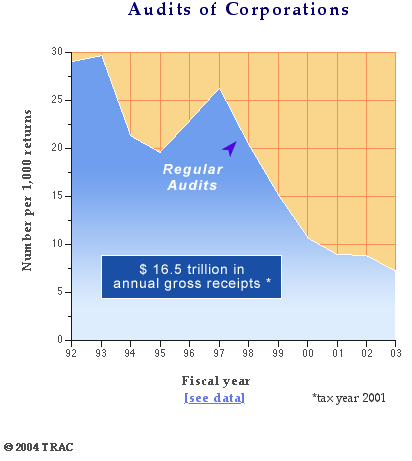|
SPECIAL NEWS ADVISORY |
|
Syracuse, N.Y.— April 12 — Timely government data show that major IRS programs to enforce the tax laws against businesses and corporations are continuing to decline, according to information obtained and analyzed by the Transactional Records Access Clearinghouse (TRAC).
Here are some highlights:
• Audits for business taxpayers are down, 3 audits per thousand tax returns five years ago, 2 audits per thousand returns in FY 2003. • The decline in face-to-face audits for all corporations (one kind of business organization) was steeper, 15 per thousand returns in FY 1999, 7 per thousand in FY 2003. • For the largest corporations, those with $250 million or more in assets, 347 out of every thousand were audited in FY 1999. This compared with 290 out of every thousand last year. • The audit rate for what are know as "pass-through entities" also has continued to decline, 4.5 per thousand in 1999, 3.2 per thousand in 2003. While long favored by lawyers and doctors, these entities are increasingly being used by thousands of firms (Enron was a trail blazer) to gain special tax advantages. These and a number of other such measures — documented by the agency's own data — indicate that the actual performance of the IRS differs in significant ways from some of the Bush Administration's claims when it comes to cracking down on corporate scofflaws.
In a March 15 speech at the National Press Club in Washington, for example, IRS Commissioner Mark W. Everson said the first priority of the agency was "to discourage and deter noncompliance, with emphasis on corrosive activity by corporations, high-income individuals and other contributors to the tax gap."
Commissioner Everson has not been alone in talking up the government's more aggressive stance towards business. Ever since the collapse of Enron and the emergence of a series of other corporate scandals, President Bush has repeatedly emphasized that the government was confronting the challenge of improper business practices. Most recently, for example, in a March 25 speech, the president said his administration had acted "strongly" when it learned from the recent business scandals that some corporate leaders had not told the truth. The message sent out by his team, he added, "should be loud and clear to the people in the business world: we're not going to tolerate dishonesty in the boardrooms of America."
However, in addition to the continuing decline in a variety of audit programs aimed at businesses, information collected separately by the Justice Department and the courts show that federal tax prosecutions have also continued their long slide, now totaling about half what they were a decade ago and one third lower than what they were five years ago.
An essential element to delivering on the administration's promise of tougher enforcement — particularly for business organizations and the wealthy — is trained personnel. But since 1988, the agency's permanent staff has shrunk by 31% while individual returns filed, for example, increased by 26%. And according to recent reports by the IRS Oversight Board and the General Accounting Office the administration's proposed FY 2005 budget almost certainly is not sufficient to increase enforcement staff as announced.
[For the latest comprehensive data about federal tax enforcement and the taxpayer services offered by the IRS go to http://trac.syr.edu/tracirs/]
(TRAC, associated with Syracuse University, is a non-partisan organization established in 1989 to provide the American people with comprehensive information about the operations of the federal government. Its operations have been supported by the university and a number of philanthropic organizations including the Knight Foundation, the Rockefeller Family Fund, the Open Society Institute, the Beldon Fund, and the New York Times Company Foundation. For detailed information about where the latest data are now available go to http://trac.syr.edu/media.)
WWW: http://trac.syr.edu
E-mail: trac@syr.edu
Washington, D.C.: Suite 200, 1718 Connecticut Avenue, N.W., 20009
Tel. (202) 518-9020
Syracuse: 488 Newhouse II, Syracuse, NY 13244-2100 Tel. (315) 443-3563

